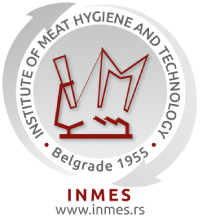Liver patѐ: process hygiene, quality parameters and thermal process
Abstract
The aim of this paper was to assess the manufacturing process of liver patѐ (150 g) packed in cans designed for the domestic market. The investigation included hygiene of the manufacturing process, product quality and control of heat treatment. Process hygiene was assessed through determining microbial numbers in canned stuffi ng before heat treatment, immediately after filling and during the wait time for the canning process (up to 150 minutes). Sulphate reducing Clostridia were not detected, Escherichia coli numbers ranged from 3,08 up to 3,25log CFU/g−1, Enterobacteriaceae from 2,96 up to 3,08 log CFU/g−1 and total aerobic colony count from 5,75 up to 6,36 log CFU/g−1. Average chemical and physico-chemical product paramaters were determined: total protein content (9,66±0,61%), fat content (22,32±1,05%), sodium chloride content (1,49±0,04%), aw (0,96±0,005), pH (6,44±0,11) and nitrite content as NaNO2 (7,44±1,97 mg/kg−1). Determined chemical and physico-chemical parameters were in accordance with the requirements of domestic legislation. Heat tr eatment lasted 1 hour and 30 minutes. Effective sterilization time was 55 minutes, at autoclave medium temperature 114°C and a pressure of 3.2 bar. Lethality of the heat treatment was controlled by thermocouple probes placed in thermal centre of cans in six point checks and determining Fo values which ranged from 7,24–8,58. This thermal regime, supported by can hermeticity, was suffi cient to ensure the safety of the canned liver patѐ.





